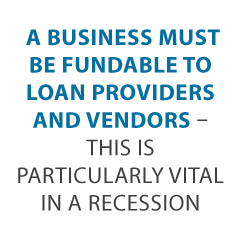Check Out These Crowdfunding Terms You Should Know in a Recession
Crowdfunding can seem to be a bit of a mystery. Why are people willing to part with their cash in this particular manner? There are a lot of crowdfunding terms you should know in a recession. They are thrown around all the time and they can sometimes get confusing. So consider this your primer on some basic crowdfunding terminology.
Because even if you do not think you will use this method of fundraising, you will probably encounter it all the same.
But before going any further, does crowdfunding ever actually, you know, work?
Crowdfunding Success, in a Nutshell
For some companies which crowdfund, the rewards are great. According to Crowdfunding Blog, the single most successful crowdfunding campaign was for the Pebble Time Smartwatch. And that was as of November of 2018. But before you run out and buy one, note that they are now a part of FitBit.
As in, they went out of business in July of 2018. And this is a business which raised over $20 million in 2015. That is no typo. And in point of fact, Pebble holds three of the top six spots in the biggest crowdfunding successes of all time. Together, these three crowdfunding campaigns took in a staggering $43.39 million. This is about $8 million more than the town of Huntington, New York (population 203,264) budgeted for highways in 2018.
Hence there is one thing that should be clear to all. Runaway crowdfunding success is no guarantee whatsoever of actual success.
But now it is time to get to the crowdfunding terms themselves.
Crowdfunding Terms You Should Know in a Recession: Project
A project is what you are asking for money for. Projects can take a few months or even years. The more complex your project, then (usually) the longer it will take. The person starting the project is generally called the project runner or the project creator.
Projects can be for goods or for services.
Crowdfunding Terms You Should Know in a Recession: Donors
The people who donate to the project are called donors. Or sometimes they are referred to as contributors or backers.
On rare occasions, they may even be called investors. However, such a word connotes a far different relationship. Many crowdfunding platforms shy away from such a term. And this is for good reason. It is because investors and investments may come under the purview of the SEC. The Securities and Exchange Commission exists in order to protect investors. This is in ways not current available to donors 0r other contributors to the success of businesses.
Hence, unless the crowdfunding platform is specifically for investing in companies, more like angel investing, you are not too terribly likely to see the investor.
Crowdfunding Terms You Should Know in a Recession: Campaign
The act of requesting money on a crowdfunding platform is called a campaign. This is the soup to nuts of crowdfunding. So it covers everything from the first pitch to the final collection or perk distribution.
Crowdfunding Terms You Should Know in a Recession: Donor Levels
In general, donor levels refer to the amount of rewards which are on offer for a particular size donation. Note: I will get to rewards in a moment. Your donor levels might look something like this:
- $10 fountain pen (100 available)
- $20 includes $10 level plus a tee shirt (50 available)
- $50 includes $20 level plus a framed picture (30 available)
- $100 includes $50 level plus dinner with the project runner (10 available)
- $500 includes all other perk levels plus a new car (2 available)
Donor levels are limited by your imagination and your capacity for handling complexity. After all, five separate donor levels mean you are keeping five separate lists. If you are well-organized, then this is possible. But it is not easy. Five separate donor levels are plenty, particularly for people running their first campaigns.
Truthfully, you will be a far happier person if you cut the number of donor levels to no more than three.
Of course, time and budget should be considerations for anyone. But that is not just the case for crowdfunding.
What frustrates you the most about funding your business in a recession? Tell us in the comments.
Crowdfunding Terms You Should Know in a Recession: Rewards (Also Known as Perks)
One basic about crowdfunding for creative projects is that you will need to provide incentives for your donors to open up their wallet. Crowdfunding to help someone with their medical expenses is a different animal. So let us get back to crowdfunding for business funds.
This is where perks come in.
Your rewards can be nearly anything. But it can quite literally pay to have them relate directly to your project.
For example, if you are crowdfunding to get enough money to back your new smart phone invention, then your rewards probably should not be your grandmother’s blueberry muffin recipe. And this is no matter how wonderful it may be. Instead, you could base your rewards around your invention. So this could be everything from offering a case to an extra battery or charger. Or you might even offer an app which only your donors can download.
A Word to the Wise about Rewards
Rewards are a very real part of crowdfunding and they can often be a part which project creators do not take into consideration. Sometimes, we think a product will go to market in, say, a year. But circumstances change, and now one year turns into two. So be it – this sort of thing happens all the time.
But it is an issue if your perks are dependent on your product going out the door. So if you need to fulfill perk promises to 10,000 people, you will likely find you need to do one of any of these things:
- Delay your product launch
- Hire someone to do fulfillment for you
- Offer alternative perks (if you can)
Reneging is not an option, and it can get you on the wrong end of a lawsuit if you are not careful.
A fourth option is delaying perk fulfillment. Not every donor will go for that.
A For-Instance on Perk Level Complexity
Sending out so many perks is a major task. It can take months to get everything out the door.
Why does it take so long? Consider the degree of complexity. Let’s go with an easy number: 100. So let’s say you have 10 separate perk levels and they each have 10 slots. Once an eleventh person wants a certain perk level, they just plain can’t have it, as it’s gone. Are you with me so far?
Your ten separate perk styles may be of differing weights. So this means they will have different shipping costs. If any of your 100 donors are outside of the United States, then you will have to pay more to ship to them as well. Plus of course you have to make sure all of the addresses are complete and correct.
It becomes even more complex when your perks do not fit into such neat little buckets. This is where you have, say, eight perks. And you might have anywhere from 12 to 1,000 people who are supposed to be getting them. Plus some people may have donated twice and are waiting for two separate perks. Or maybe even more.
See how ugly and difficult this can get – fast?
What frustrates you the most about funding your business in a recession? Tell us in the comments.
Getting Around This Problem
The easiest way to get around these issues is to offer intangible perks. In our smart phone example, the exclusive app would fit the bill nicely. Your best bet is to make the intangible perk good for the largest number of donors possible.
Hence if your lowest level is $10, and you have 100 of those slots, then you could just give 100 people a download code. This is a lot faster than figuring out postage for all of those donors. Plus, with an intangible perk, technically the number of perks is effectively infinite. But scarcity gets people interested, so you might not want to make the downloads never-ending.
For the more tangible perks, leave them for far smaller groups, such as the 25 people who are at your two top donor levels. Mailing to 25 people is far easier than it is to mail to 10,000 people. And this is so even if the mailings are difficult.
But I Don’t Have Intangible Perks!
No? Then what do you call a coupon sent in email? See, there are ways to offer intangible perks even when the entire business operation is very, very tangible. Coupons have been around, seemingly, forever. People will gladly print them off or carry them in their smartphones for scanning.
Or there can be discount codes, which are virtually the same thing, except with no designing of a coupon to be cut out or scanned. Amazon, for example, gives these out all the time. And the vast majority of backers will know exactly how to use them.
Crowdfunding Terms You Should Know in a Recession: Rewards-Based Crowdfunding
Probably the best-known of all crowdfunding platforms is Kickstarter. Kickstarter is, by its own rules, just for project creation. That is, it is not for charitable donations. This puts it squarely in the camp of rewards-based crowdfunding. That is, the project exists for the purpose of getting a new market to product or the setting up of a new business.
This form of crowdfunding offers rewards (perks), which are either physical or intangible. It can also serve as a means of pre-selling a product before even a prototype has been made. However, until there is an actual available product, is it a sale, or not? While it is easy to try to dismiss such a concern as no big deal, well, not so fast.
Whether perk fulfillment is a sale or not just might matter.
Sales and the Law
In the United States, the sales of almost 100% of all goods are covered by the Uniform Commercial Code. This set of laws is identical virtually everywhere in the country except in the state of Louisiana. And even there, it is still rather close.
The UCC covers any number of concerns with products. These include merchantability, which asks if a product can reasonably be sold. And it also includes fitness for a particular purpose. But it does not cover liability in case a product injures a person. Still, that can be another question, in case something like that happens.
Product Injuries
When a product injures someone (in the law, this is called product liability), it does not matter if the injured party directly bought the product or borrowed it from another or the like. However, at a certain point, it becomes such a tenuous and far-reaching relationship between product creator (that is, the manufacturer) and the final end user that questions as to cause and effect can arise.
While new products sold via crowdfunding are, without a doubt, sales, what about perks?
Are perks sales, or not? They do not seem to be gifts. After all, when was the last time you paid anything for a gift? Is it not the very definition of a gift that there is no cost?

Consideration
In general, in contract law, a sale is an exchange of goods (or services) for a price or fee. This price or fee is referred to as a consideration. A consideration is either a fee or its equivalent, such as through barter. The consideration does not have to be equal in value to the sale price of the goods. That is, the transaction does not stop being a sale just because the buyer got a really good deal, or a really bad one.
Yes, selling your house for $1 is, technically, a sale.
If a perk is worth $1 but is only available at the $10 donation level, what then? But if it is a sale, then the UCC should apply, yes? If the perk injures someone, then the question does not really start to matter until the end user is extremely far-removed from the project creator.
These questions do not seem to have been litigated yet. It will be interesting to see what happens when, inevitably, they are.
Crowdfunding Terms You Should Know in a Recession: Equity-Based Crowdfunding
When businesses look to hand over percentages of ownership in exchange for current financial backing that is called equity-based crowdfunding. Kickstarter, for example, does not allow this. But there are platforms such as AngelList and Crowdfunder which do.
After the passage of the 2012 JOBS Act, smaller companies have more freedom to crowdfund and hand over equity shares. And this is without quite so many Securities and Exchange Commission (SEC) filings as were needed before. This federal law opened up crowdfunding more. And it made it a far more attractive option for startups in particular. The SEC, naturally, has an interest in this particular species of crowdfunding.
Crowdfunding Terms You Should Know in a Recession: Debt-Based Crowdfunding
This form of crowdfunding is also called peer to peer lending. Other names for it are P2P, crowdlending, and marketplace lending. Borrowers will set up campaigns in order to fulfill their financial needs. And then lenders will contribute toward the goal for an interest.
This particular method of online funding may come with other consequences. It could very well become a true “threat to the traditional banking system in the areas of consumer and business loans, as has already been demonstrated by the rapid success of [these] online lending marketplaces.” (Hollas, Corporate Finance Review, Volume 18).
As the United States economy changes over time, peer to peer lending may very well be the only way for some businesses to get funding. But look for regulators to start to step in, particularly if there are instances of fraud or more serious criminal activity.
Crowdfunding Terms You Should Know in a Recession: Litigation Crowdfunding
And speaking of criminal activity, there is also litigation crowdfunding. With litigation crowdfunding, a plaintiff will ask for a monetary donation for the purposes of funding a court case. If the plaintiff prevails, then investors may get more than their initial investment.
Unlike some of the other forms of crowdfunding, there are ethical considerations when it comes to litigation crowdfunding. Ethics problems include the possibility of unlawful interference in an attorney-client contract.
Lawyers and Ethics and Crowdfunding and Money
Another possible issue involves providing information to backers. In other forms of crowdfunding, backers understandably want advance information on a campaign. understandably, they want to know precisely what they are financially getting themselves into. But in the case of the law, such transparency can very well mean violating attorney-client privilege. If privileged communications are necessary to get donors to fork over cash, then this is an ethical violation for the lawyer.
Plus, what happens if the backers push for a greater return on their investments? Could a group of backers – or a crowdfunding platform – push for a settlement for sure money? Or could they push for a trial in the hopes of a big payoff? Either scenario is possible.
And there is even another possibility. What if the crowdfunding platform or backer group pushes to direct the course of discovery, or even motion practice?
And what happens if, somehow, it gets out at trial that a case is crowdfunded? What will a jury think? Will they see the plaintiff as greedy? Or will they see the case as more likely to win? Otherwise, the reasoning could go, why would people put their money on the line for it?
These questions go beyond dilemmas and interesting philosophical exercises. They could, if things go too far, end up being a part of disciplinary proceedings against a lawyer in an ethics investigation.
Crowdfunding Terms You Should Know in a Recession: Donation-Based Crowdfunding
In this form of crowdfunding, a charity solicits donations via a crowdfunding platform. There are either no perks or they are tiny. The best-known of these is probably GoFundMe. This is where project runners can either raise funds for themselves or for charities.
Donation-based crowdfunding also encompasses the far too common crowdfunding pleas we all see cropping up these days. These crowdfunding pleas are for everything from help paying medical or veterinary bills to attempts to get donors to fund dream vacations and honeymoons. Or they can even be to just fix the project runner’s car.
Without perks or presales, there are no UCC considerations. But there can be questions from state governments if a charity raises funds via crowdfunding and then someone just pockets the money. After all, the government wants to know if charities are on the up and up.
What frustrates you the most about funding your business in a recession? Tell us in the comments.
Crowdfunding Terms You Should Know in a Recession: Bootstrapping
In the absence of crowdfunding, startup founders often used bootstrapping to get their projects off the ground.
Bootstrapping is just the use of personal finances to fund a new company. The biggest advantage to bootstrapping is that a business owner does not have to give up any ownership in the company.
The biggest disadvantage, of course, is the loss of a life’s savings is a very real possibility. Crowdfunding in particular is meant as a means of minimizing bootstrapping. But it probably will never eliminate it entirely.
Crowdfunding Terms You Should Know in a Recession: Takeaways
Crowdfunding is an interesting method of raising money for a business. But it has its own rules and methods. There are potential pitfalls along the way. Crowdfunding can, at times, feel like the wild, wild west.
But at least with these crowdfunding terms you should know in a recession, you can be more prepared to handle anything crowdfunding throws at you. And as always, if you have any questions, please feel free to ask them in the comments section of this blog post.
The post Crowdfunding Terms You Should Know in a Recession appeared first on Credit Suite.







